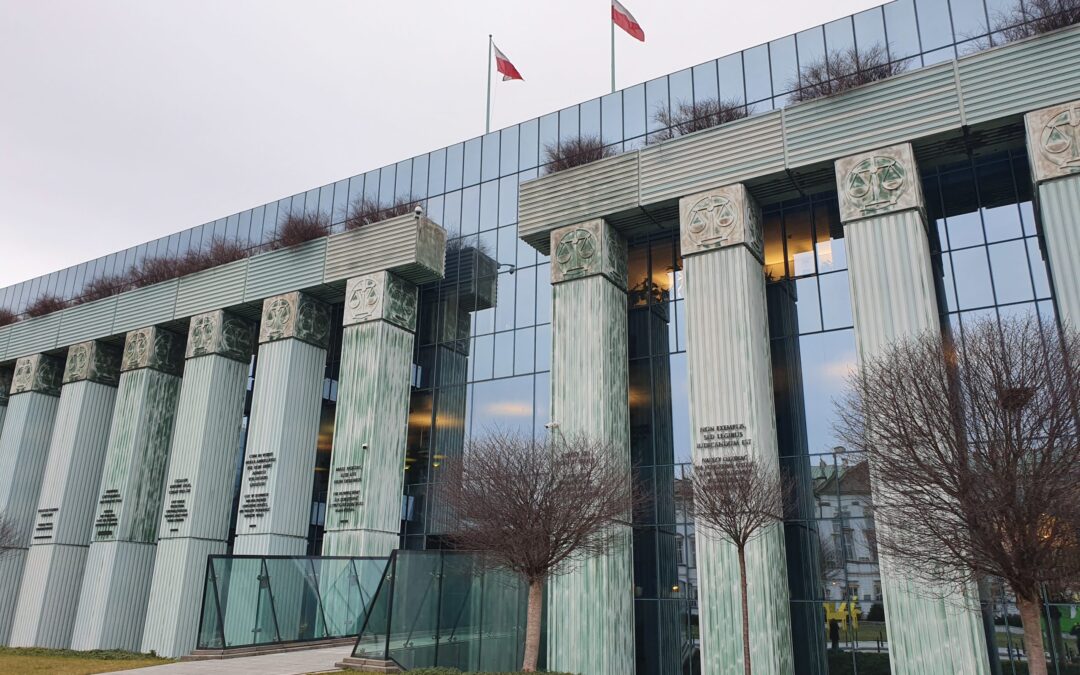
Jul 22, 2020 | Advocacy, Cases, Legal submissions, News
The ICJ and Amnesty International have submitted a joint third party intervention before the European Court of Human Rights in the case of Judges Mariusz Broda and Alina Bojara.
The case concerns the premature termination of their mandates as vice-presidents of the regional tribunal of Kielce in Poland. The two judges, that had been appointed to six-year terms in 2014, had their position revoked by the Minister of Justice in 2018.
The revocation was based on article 17.1 of the Law of 12 July 2017 modifying the Law on the Judicial System. This provision, presented and approved by the ruling Law and Justice Party (PiS), gave the Minister of Justice the power to revoke courts’ presidents and vice-presidents without justified grounds and with no possibility of appeal.
The two judges applied to the European Court of Human Rights alleging that they had been denied access to a tribunal to challenge the termination of their mandate .
In their third party intervention, the ICJ and Amnesty International analyze international standards on judicial independence, including as regards the role court presidents and vice-presidents, and the consequences of these standards for the right of access to court under Article 6.1 ECHR. The intervention also analyses the recent legislative and policy developments that have seriously undermined the independence of the Polish judiciary.
Read the full intervention here: Broda_v_Poland-AmicusCuriae-ICJ&AI-Cases-2020-ENG.
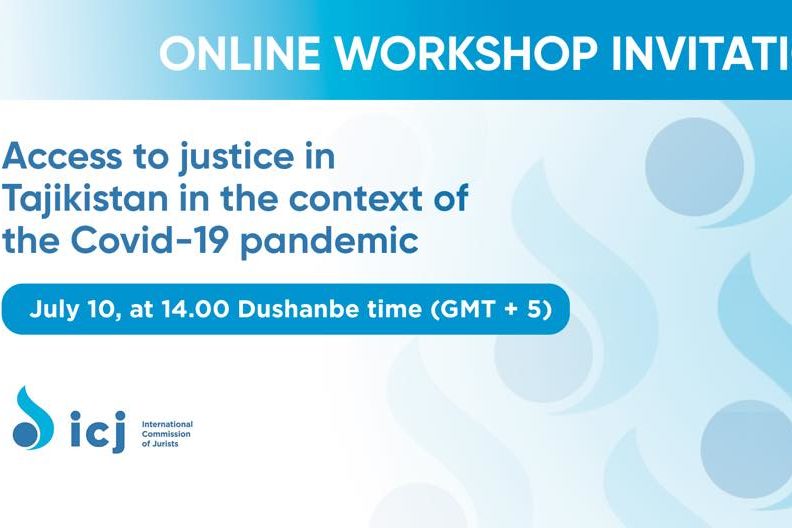
Jul 9, 2020 | Agendas, Events, News
The ICJ is holding an online discussion for lawyers and other representatives of civil society in Tajikistan on access to justice in the context of the Covid-19 pandemic. The discussion is held on 10 July 2020 from 14.00 to 17.00 Dushanbe Time (GMT + 5) on the GoToMeeting platform
The discussion aims to raise some of the main issues that lawyers face in providing legal representation both in and outside of courts.
The event will present an opportunity for practicing lawyers, NGOs and IGOs to discuss the recent challenges that the legal profession faced in Tajikistan as well as seek some of the solutions based on international law and best practices of other countries.
During the discussion, relevant international law and standards as well as comparative examples from the Central Asian countries and Azerbaijan will be discussed.
To participate in the discussions registration is required on the following link : https://forms.gle/QRywqBFPSxfR5eyk7
Working languages of the event are Russian and Tajik.
Contact:
Dilshod Juraev, t: +992 77 700 18 34 ; e: Dilshod.jurayev(a)icj.org
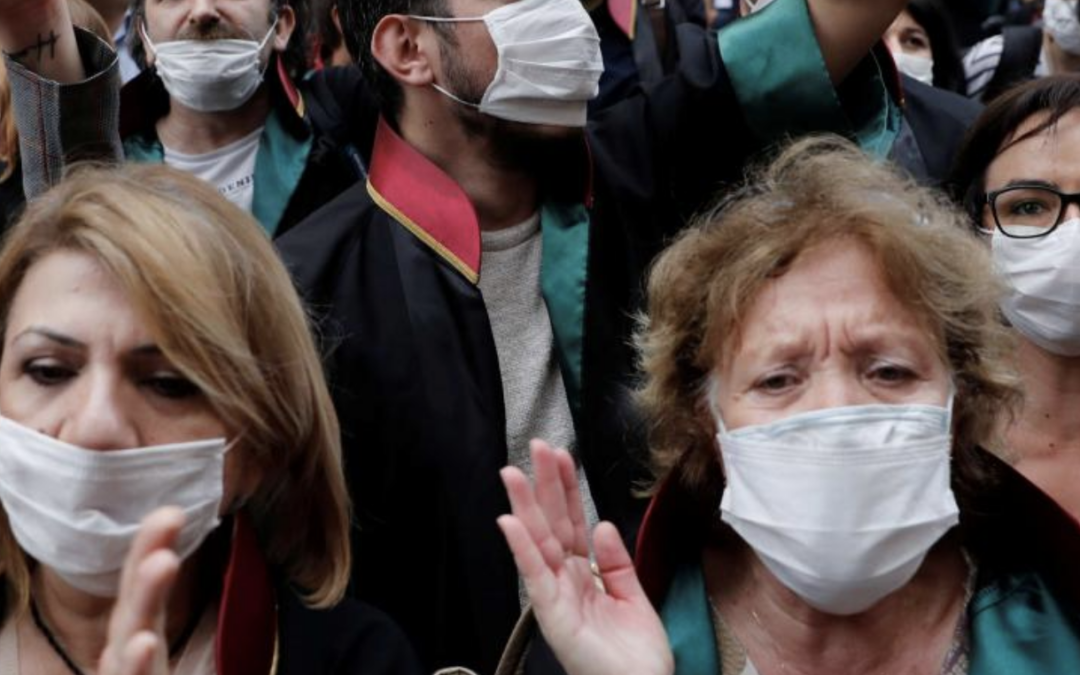
Jul 8, 2020 | News
Draft law reduces leading bar associations’ authority, leads to creation of rival groups, the ICJ and Human Rights Watch said today. The Turkish government’s plan to allow for multiple bar associations appears calculated to divide the legal profession along political lines and diminish the biggest bar associations’ role as human rights watchdogs, they added.
The current bar associations have not been consulted, and 78 bars out of 80 signed a statement opposing the plan.
The ICJ and Human Rights Watch have published a question and answer document explaining the draft law, scheduled for a vote in parliament in the coming days. The document outlines the government-led effort to reduce the influence of leading bar associations, reflecting the executive’s growing dissatisfaction with the bar associations’ public reporting on Turkey’s crisis for human rights and the rule of law.
“Turkey’s prominent bar associations play a key role in defending fair trial rights and scrutinizing human rights at a time when flagrant violation of rights is the norm in Turkey,” said Hugh Williamson, Europe and Central Asia director at Human Rights Watch.
“The government move to create multiple bars and dramatically cut leading bars’ representation at the national level is a clear divide-and-rule tactic to diminish the bar associations’ authority and watchdog role,” he added.
The proposed amendments provide that in provinces with over 5,000 lawyers, a group of at least 2,000 lawyers can establish alternative bar associations.
In big cities such as Istanbul, Ankara, and Izmir, several bar associations could be established. The amendments would also greatly reduce the representation of the largest bar associations at the national level within the Union of Turkish Bars, the Ankara-based umbrella body with significant financial resources it controls and distributes to provincial bars.
The fact that the vast majority of elected legal profession representatives oppose the move and that the likely impact will be to greatly diminish the authority of leading provincial bars that have been critical of certain government initiatives demonstrates that the aim of the proposed change is to shield the government from justified criticism, the ICJ and Human Rights Watch said.
Drastically cutting the number of delegates from large bar associations representing thousands of lawyers to the national Union of Turkish Bar Associations would reduce the influence of the large bar associations in electing the national group’s president and participating meaningfully in other decision-making functions.
A provincial bar association with fewer than 100 lawyers, such as Ardahan in northeastern Turkey, for example, would be represented by 4 delegates, compared with 3 at present.
But a bar association such as Izmir in western Turkey, with over 9,500 lawyers, which sends 35 delegates, would be entitled to only 5. Istanbul, Ankara, and Izmir Bar, which represent 55 percent of the lawyers in Turkey, would be entitled to only 7 percent of all delegates within the national union.
The atmosphere of conflict in which the draft law has been introduced, its timing, and the lack of consultation with the bar associations themselves provides credible grounds for great concern and skepticism over the government’s motives, the groups said.
Over the past year, Turkey’s presidency and government have made public statements strongly criticizing leading bar associations in response to the bars’ legitimate expression of concerns about Turkey’s rule of law crisis and executive interference in the justice system.
The government has reacted strongly against the bars’ scrutiny of its failure to uphold human rights obligations through bar association publication of reports on torture, enforced disappearances, and other rights abuses ignored by the authorities.
For these reasons, the government’s proposed amendments are clearly designed to achieve a political purpose unrelated to an effort to advance or strengthen standards in the legal profession, the ICJ and Human Rights Watch said.
The government’s move is politically divisive and will contribute to undermining the appearance of independence and impartiality in the justice system.
“The government should immediately withdraw the current proposed amendment and embark on a process of full consultation with bar associations,” said Róisín Pillay, Director of ICJ’s Europe and Central Asia Programme.
“The government’s plan as it stands will only deepen mistrust in Turkey’s justice system as lacking independence by dividing the legal profession along political lines. This could have disastrous long-term consequences for upholding the role and function of lawyers and for fair trial rights.”
Contact:
Róisín Pillay, Director of ICJ’s Europe and Central Asia Programme, t: +32-2-734-84-46 ; e: roisin.pillay(a)icj.org
Massimo Frigo, Senior Legal Adviser, ICJ’s Europe and Central Asia Programme, t: +41-79-749-99-49 ; e: massimo.frigo(a)icj.org ; Twitter: @maxfrigo
Download
Turkey-Q and A on the bar associations-Advocacy-2020-ENG (Q & A, in PDF)
Turkey-Q and A on the bar associations-News-Press releases-2020-TUR (Story in Turkish, PDF)
Turkey-Q and A on the bar associations-Advocacy-2020-TUR (Q & A in Turkish, PDF)
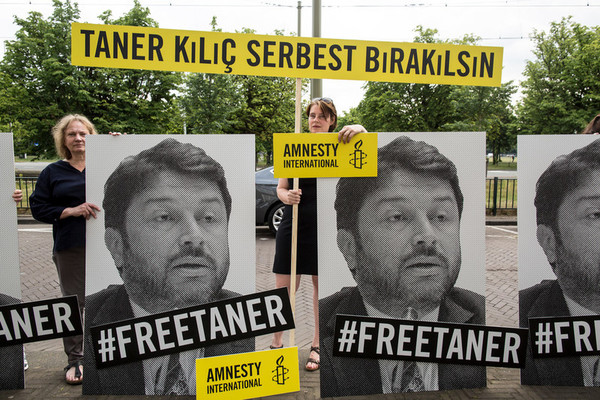
Jul 3, 2020 | News
The ICJ deplores today’s conviction of former Amnesty International Turkey President Taner Kılıç, and former Chair of Human Rights Agenda Association Günal Kurşun, former Director of Amnesty International Turkey İdil Eser and human rights defender Özlem Dalkıran by the Istanbul 35th Heavy Penal Court, on clearly unfounded terrorism charges.
“These convictions, which were clearly revealed to be baseless during the trial, are an alarming setback to efforts to restore the rule of law in Turkey,” said Massimo Frigo, Senior Legal Adviser for the ICJ Europe and Central Asia Programme.
“This prosecution and conviction constitute harassment of human rights defenders, in violation of a number of Turkey’s international legal obligations. The Turkish authorities should be protecting human rights and supporting the important work of human rights defenders, but instead we have witnessed a continuing pattern of arrests on human rights defenders in the country,” he added.
Taner Kılıç has been sentenced to six years and three months of imprisonment for “membership of a terrorist organization. Günal Kuşun, İdil Eser and Özlem Dalkıran were sentenced to one year and 13 months of imprisonment for “assisting a terrorist organisation”. This decision was taken by majority, with one dissenting opinion that called for their acquittal.
The Court acquitted the other defendants in the case: Nalan Erkem, İlknur Üstün, Ali Gharavi, Peter Steudtner, Veli Acu, Nejat Taştan et Şeyhmus Özbekli.
On 6 June 2017, Taner Kiliç, then President of Amnesty International Turkey was arrested on spurious terrorism charges. The other human rights defenders were arrested while attending a training in Istanbul on digital security and information management; also reported arrested were two trainers (reportedly a German and a Swedish national) and the owner of the training venue.
In Turkey, anti-terrorism offences are oftentimes abused and are applied in over-extensive terms to charge and prosecute human rights defenders and political dissenters, as it occurred in this case. The ICJ has highlighted this problem in several reports, including in its submission to the UN Human Rights Council on the universal periodic review of Turkey.
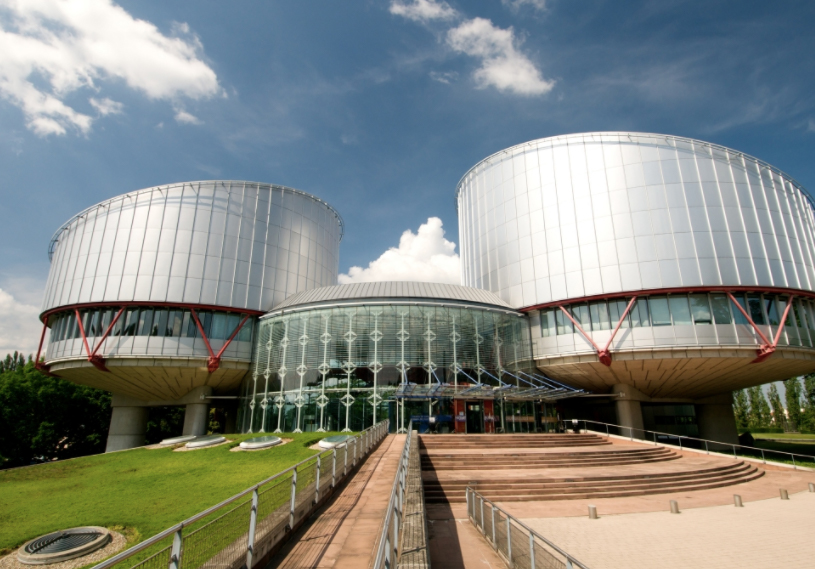
Jun 26, 2020 | Cases, News
The ICJ today welcomed the judgment by the Court in the case of Bagirov v. Azerbaijan. It found that the suspension from legal practice and subsequent disbarment of Khalid Bagirov violated his rights to freedom of expression and to respect for private life under Articles 10 and 8 of the European Convention on Human Rights (ECHR).
Khalid Bagirov’s suspension from the practice of law was based on his public criticism of ill-treatment by the police, following the wide media coverage of the death of an individual in police custody. Later he represented the victim as a lawyer in the proceedings.
His subsequent disbarment arose from his remarks about a judge made in the courtroom when representing his client in another high-profile case.
The ICJ intervened in this case as a third party, providing an evaluation of the State’s obligation to protect the right to freedom of expression of lawyers in light of international standards on independence of the lawyers and the consequences of disciplinary proceedings for lawyers’ rights under Articles 8 and 10 ECHR.
The ICJ calls on the Azerbaijani authorities to fully and promptly implement the judgment, including by taking steps to restore Khalid Bagirov as a member of the Azerbaijan Bar Association.
“Khalid Bagirov must now be reinstated as a lawyer and be allowed to resume his legal practice in Azerbaijan,” said Massimo Frigo, ICJ Senior Legal Adviser.
“But in addition, this judgment shows that measures need to be taken to address the systemic problem of unjustified disbarments of lawyers who seek to defend human rights in Azerbaijan. Reforms are needed to ensure that the disciplinary process is independent and fair and that penalties are proportionate.”
In its judgment of 25 June 2020, the Court held under Article 10 of the Convention that the reasons given by the domestic courts in support of Khalid Bagirov’s disbarment were not relevant and sufficient, and that the sanction imposed on him was disproportionate to the legitimate aim pursued, having highlighted that “the disbarment cannot but be regarded as a harsh sanction, capable of having a chilling effect on the performance by lawyers of their duties as defence counsel”.
In relation to Article 8 ECHR, the Court further noted that “…in a series of cases it has noted a pattern of arbitrary arrest, detention or other measures taken in respect of government critics, civil society activists and human rights defenders … Against this background, the Court underlines that, notwithstanding the duties, in particular, with respect to their conduct, with which all lawyers must comply, the alleged need in a democratic society for a sanction of disbarment of a lawyer in circumstances such as this would need to be supported by particularly weighty reasons” which had not been established in this case.
In respect of the suspension of the lawyer, the Government contended that the interference with Mr Bagirov’s rights to private life and freedom of expression had been prescribed by law and pursued the legitimate aims of preventing the disclosure of information received in confidence or maintaining the authority and impartiality of the judiciary.
The Court found that, he was not the victim’s lawyer when he made the impugned statements about the police, furthermore, the Court mentioned that it did not find any provision of domestic law preventing a lawyer from calling for peaceful protests against police brutality for the purpose of preventing violence.
The Court further found that while Mr Bagirov’s remarks, about a judge’s lack of capacity, were capable of being offensive, the sanction imposed on him did not struck a fair balance between the need to protect the authority of the judiciary and the need to protect his rights to private life and freedom of expression.
In this connection, the Court stated that inter alia, Mr Bagirov had confined himself to making a statement in a courtroom as a lawyer, in the context of his objections to the shortcomings of the proceedings.
Background
In addition to its intervention in Bhagirov v Azerbaijan, the ICJ has also intervened as a third party in other cases of lawyers from Azerbaijan (Hajibeyli and Aliyev v. Azerbaijan, nos. 6477/08 and 10414/08, § 54, 19 April 2018).
In 2019, the ICJ published recommendations to the Azerbaijan Bar Association on the role and independence of Lawyers,
In 2016, the ICJ published a mission report Defenceless Defenders: Systemic Problems in the Legal Profession of Azerbaijan
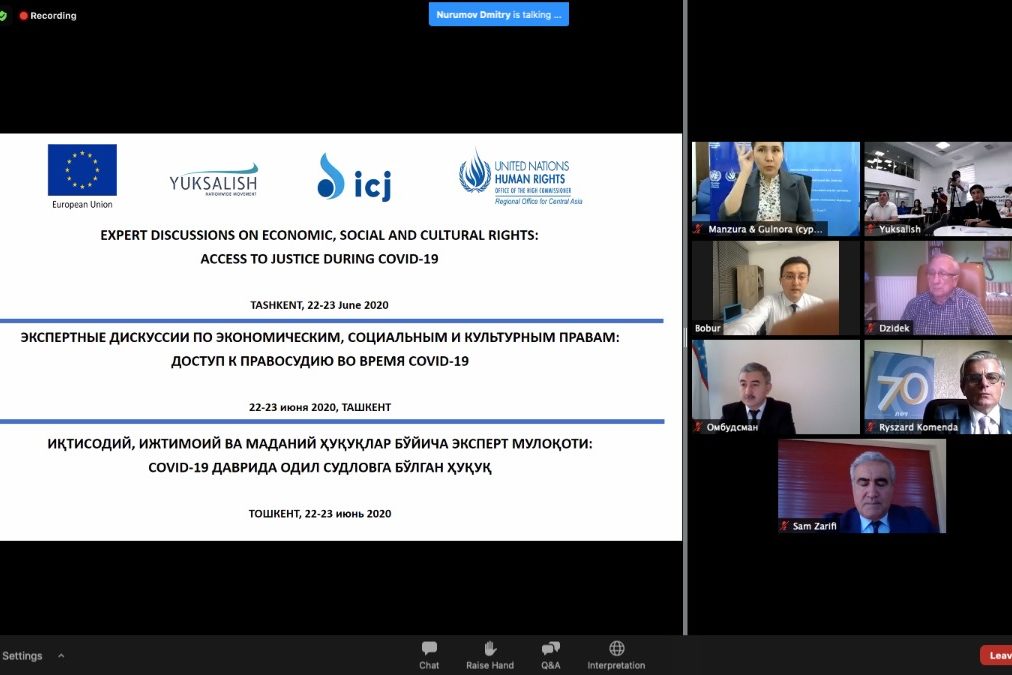
Jun 22, 2020 | News
Today, the ICJ, the Regional Office of the UN High Commissioner for Human Rights (OHCHR) for Central Asia and the Nationwide Movement “Yuksalish” are holding an Expert Discussion on the impact of COVID-19 on access to justice for economic, social and cultural rights (ESC rights) in Uzbekistan and comparative experiences from Europe and Central Asia.
The Fifth Expert Discussion, Access to justice in times of COVID-19, will address issues including access to a lawyer and access to court.
The event will present an opportunity to national and international experts, including lawyers, judges, members of UN human rights bodies, civil society, and other experts to debate questions of fundamental importance for ensuring access to justice and the protection of human rights in Uzbekistan.
“The COVID-19 pandemic has put new challenges before justice institutions around the world, including in Uzbekistan. These measures affected access to lawyers and courts judiciary therefore impeding full access to justice. This event will present an opportunity to discuss the solutions of States from around the globe about their responses to the pandemic. We believe that sharing experience among judges, lawyers and international experts from around the world will enrich the National debate and give an impulse for further development and the independence of the judiciary in Uzbekistan” said Akmal Burkhanov, Chairperson of the Nationwide movement “Yuksalish”.
“The pandemic became the so-called “maturity test” for the justice system and many of the urgent issues should be resolved in the light of the anti-COVID-19 measures taken. Therefore, I would also see the pandemic as an opportunity. The opportunity for transforming, changing for the better the functioning of traditional courts, provided that a high quality of justice and respect for individual rights are at the forefront of all changes,” pointed Eduards Stiprais, EU Ambassador to Uzbekistan.
Ryszard Komenda, Regional Representative of the UN Office for Human Rights for Central Asia quoted the UN High Commissioner for Human Rights, Michelle Bachelet, who stated that “in order to cope effectively with the pandemic states may need to introduce certain restrictions on the exercise of certain human rights, however, such restrictions need to be necessary, proportionate, and non-discriminatory”. Mr. Komenda noted that “the impact of the regulations on lockdown affected the day-to-day work of courts and lawyers. From the perspective of international human rights standards, it is crucial that the right of individuals to an operative and independent judicial system, in particular the right to an effective remedy, habeas corpus guarantees and access to a lawyer of one’s choosing are strictly adhered to”.
“Our fifth Expert Discussion on economic and social rights, is devoted to addressing the major problems people have in getting access to justice and defending their rights during the global COVID-19 pandemic,” said Sam Zarifi, the ICJ Secretary General.
“The ICJ has documented how around the world the pandemic has severely affected peoples’ right to health, to food, to water, to education and to sanitation, and we have also seen the additional difficulties facing people with lower income and access to the levers of power.”
“We aim to discuss how international law and national best practices can help the judiciary and legal system alleviate some of the human rights issues arising from Covid-19 in Uzbekistan, and maybe even build a more responsive and accountable system after the pandemic.”
Background:
The Expert Discussions on ESC rights aim to raise awareness about the implementation of international law and standards on ESC rights by the national justice system, to facilitate access to justice in relation to ESC rights and promote effective use of international law on ESC rights at the national level. Each Expert Discussion is attended by international and national experts.
The first discussion was held in September 2018 on international standards in labour rights. The second meeting, held in December 2018, concerned judicial application of the principle of non-discrimination; the third meeting, held in March 2019, was dedicated to the rights of people with disabilities, and the forth meeting, held in October 2020, discussed the right to adequate housing in Uzbekistan.
Uzbekistan ratified the International Covenant on Economic, Social and Cultural Rights (ICESCR) in 1995.
The Expert Discussions are organized by the ICJ within the framework of the “Advancing Civil Society in Promoting economic, social and cultural rights (ESCR) Standards in Uzbekistan (ACCESS)” Project funded by the EU through the European Instrument for Democracy and Human Rights (EIDHR).
Contact:
Dilfuza Kurolova, ICJ Legal consultant, t: +998 90 9050099 ; e: dilfuza.kurolova(a)icj.org
Agenda:
English version
Russian version
Uzbek version










